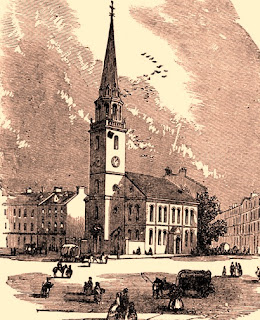When we come to study the influence of Calvinism as a political force in the history of the United States we come to one of the brightest pages of all Calvinistic history. Calvinism came to America in the Mayflower, and Bancroft, the greatest of American historians, pronounces the Pilgrim Fathers "Calvinists in their faith according to the straightest system."1 John Endicott, the first governor of the Massachusetts Bay Colony; John Winthrop, the second governor of that Colony; Thomas Hooker, the founder of Connecticut; John Davenport, the founder of the New Haven Colony; and Roger Williams, the founder of the Rhode Island Colony, were all Calvinists. William Penn was a disciple of the Huguenots. It is estimated that of the 3,000,000 Americans at the time of the American Revolution, 900,000 were of Scotch or Scotch-Irish origin, 600,000 were Puritan English, and 400,000 were German or Dutch Reformed. In addition to this the Episcopalians had a Calvinistic confession in their Thirty-nine Articles; and many French Huguenots also had come to this western world. Thus we see that about two-thirds of the colonial population had been trained in the school of Calvin. Never in the world's history had a nation been founded by such people as these. Furthermore these people came to America not primarily for commercial gain or advantage, but because of deep religious convictions. It seems that the religious persecutions in various European countries had been providentially used to select out the most progressive and enlightened people for the colonization of America. At any rate it is quite generally admitted that the English, Scotch, Germans, and Dutch have been the most masterful people of Europe. Let it be especially remembered that the Puritans, who formed the great bulk of the settlers in New England, brought with them a Calvinistic Protestantism, that they were truly devoted to the doctrines of the great Reformers, that they had an aversion for formalism and oppression whether in the Church or in the State, and that in New England Calvinism remained the ruling theology throughout the entire Colonial period.
With this background we shall not be surprised to find that the Presbyterians took a very prominent part in the American Revolution. Our own historian Bancroft says: "The Revolution of 1776, so far as it was affected by religion, was a Presbyterian measure. It was the natural outgrowth of the principles which the Presbyterianism of the Old World planted in her sons, the English Puritans, the Scotch Covenanters, the French Huguenots, the Dutch Calvinists, and the Presbyterians of Ulster." So intense, universal, and aggressive were the Presbyterians in their zeal for liberty that the war was spoken of in England as "The Presbyterian Rebellion." An ardent colonial supporter of King George III wrote home: "I fix all the blame for these extraordinary proceedings upon the Presbyterians. They have been the chief and principal instruments in all these flaming measures. They always do and ever will act against government from that restless and turbulent anti-monarchial spirit which has always distinguished them everywhere."2 When the news of "these extraordinary proceedings" reached England, Prime Minister Horace Walpole said in Parliament, "Cousin America has run off with a Presbyterian parson" (John Witherspoon, president of Princeton, signer of Declaration of Independence).
History is eloquent in declaring that American democracy was born of Christianity and that that Christianity was Calvinism. The great Revolutionary conflict which resulted in the formation of the American nation, was carried out mainly by Calvinists, many of whom had been trained in the rigidly Presbyterian College at Princeton, and this nation is their gift to all liberty loving people.


